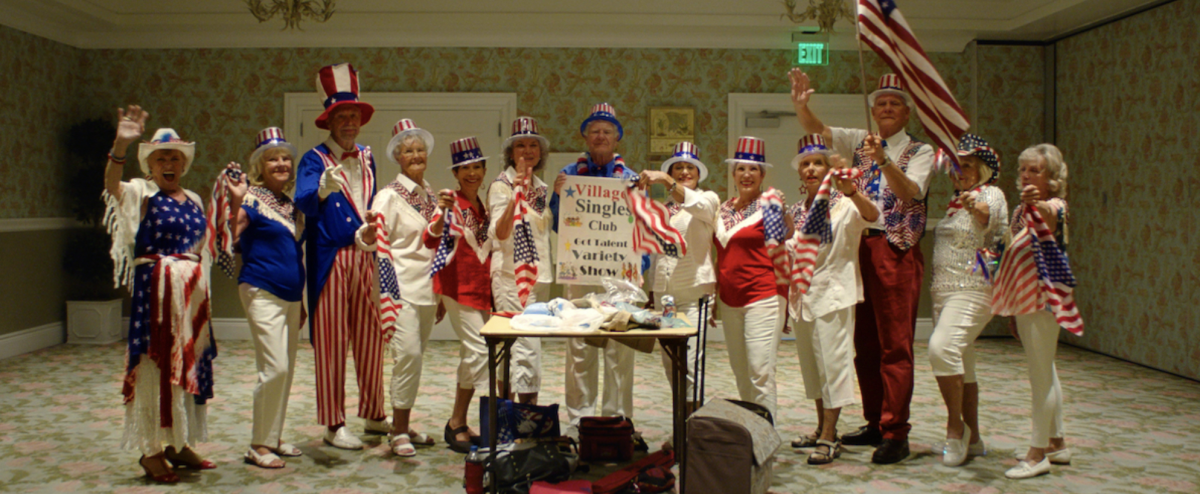Lance Oppenheim on heightened observational filmmaking and treating sources like performers
Twenty-four year-old filmmaker, Lance Oppenheim, stuck out like a sore thumb when he moved into America’s largest retirement community. He made his home amongst the retro decor, meticulously groomed golf courses and blocks of identical white-picket-fence lined houses. His neighbors, all over 55, wanted to know whose grandson he was, but Oppenheim wasn’t there to visit relatives.
He was there to film what he thought would be his senior thesis project, but evolved into an 83-minute long documentary in partnership with the New York Times, called Some Kind of Heaven.
Some Kind of Heaven, which premiered at Sundance in January 2020, has since been nominated for several industry awards which applaud the film’s narrative depth, strikingly aesthetic cinematography and subtle, yet nuanced exploration of what it means to grow old in America.
Some Kind of Heaven watches more like a fiction film than a traditional documentary as each shot is as manicured as The Villages itself. Editor Daniel Garber, who like Oppenheim graduated from Harvard’s visual and environmental studies program, said the fictional style is what makes the film compelling.
“What makes this unique among documentaries is that we really tried to think of it like a fiction film,” said Garber. “We wanted people to watch it and align with the experience of the characters, rather than it feeling like we were trying to dull out information.”
The film reveals a deeply narrative plot by following the experiences of four main people: Reggie and Anne, a couple on the verge of divorce, Barbra, a lonely widow still working full time to pay off her mortgage, and Dennis, a man living out of his van in The Villages parking lot looking for a wealthy woman to take him in.
Reggie, Anne, Dennis and Barbra were not subjects or sources, but “collaborators” said Oppenheim.
“They had an understanding of how the film was going to play and how these moments in their lives were going to fit into the larger picture,” he said. “It reinforced the idea of them as collaborators and performers, playing themselves and portraying themselves on screen and allowing us to bear witness to the things they were going through.”
Oppenheim approached his collaborators with radical transparency about his intentions and was able to build intimate relationships with them to make them feel comfortable, his crew members said.
He refers to his approach as “heightened observational filmmaking” which synthesizes subjective and expressive moments “with the tenants of fly-on-the-wall filmmaking.”
He said if at first a scene didn’t go right, they would re-enact it. Oppenheim considers himself an artist more than a journalist and describes his process as more like jazz than reporting.
“A lot of it was like jazz in a way. I was reacting in real time to things happening on the ground,” he said. “If we missed something we would recreate it.”
Oppenheim said he’d start by conducting long, exploratory interviews and then would read back his notes, picking out potential scenes, routines or sources of conflict that could be created into a scene.
Luckily, Oppenheim said, The Villages were already equipped with the perfect set for their story to play out. The developers had carefully constructed an environment that brings to life Reagan-era ideals of America. The only thing coming from the radio are hits from the 1950s and 60s and news broadcasts that reported only about good news.

The striking cinematography is another element that makes the film unlike any other.
“Each image was so controlled that it was almost like shooting a scene,” he said, explaining that he wanted the shots to be as manicured and composed as The Villages itself. “I wanted it to show real people dealing with real problems against the backdrop of a completely unreal world.”
The film successfully reveals raw, seemingly unfiltered emotion within the hyper-controlled senior utopia.
Similar to the residents living in The Villages, the documentary itself engages in a form of escapism, breaking free from the traditional and at times dull documentary format to tell a powerful story about what it means to grow old in America.
As much as the residents attempt to escape the reality of aging or pretend their worries are a thing of the past, Some Kind of Heaven subtly reveals that the notion of graceful aging is in many ways a total fallacy.
“You can grow older but you don’t necessarily grow wiser. You get to your eight decades of living on earth and you don’t know yourself anymore than you did when you were twenty,” said Oppenheim. There’s something really scary about that… But I think there’s something beautiful about the fact that you never stop trying to figure out who you are, even well into the end.”





